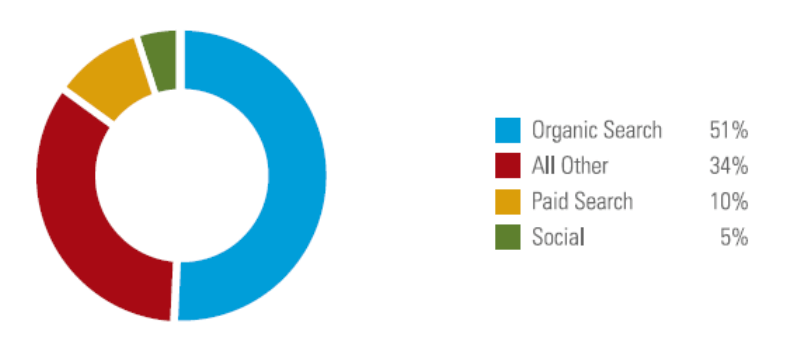Author: Neil Patel / Source: Quick Sprout The term “content marketing” is a wide umbrella. It encompasses a plethora of different strategi
The term “content marketing” is a wide umbrella.
It encompasses a plethora of different strategies and techniques.
But at the end of the day, one of your primary goals is to create content that ranks as highly as possible on search engine results pages (SERPs).
This is important because organic traffic is the number one means of generating traffic for many companies.
A study from The Bright Edge even “found that organic search drives 51 percent of all visitors to B2B and B2C websites trumping all other non-organic channels.”

This means one thing.
You need to figure out the relationship between content marketing strategies and keyword rankings.
This is instrumental in fine-tuning your content marketing campaign and finding the right areas to focus on.
In this post, I analyze data from multiple studies and draw on my own knowledge and experience to give you a clear idea of the content strategies demanding the most attention.
So, let’s see which strategies have the biggest impact on keyword rankings.
Rich content
I won’t waste your time telling you about the importance of creating quality content.
You already know that.
But I’d like to share with you this statistic from an infographic on Quick Sprout:

That’s a lot of links!
And I’m sure you know the integral role links play in SEO.
This graph from Moz illustrates the importance of links and their influence on Google’s algorithm:

Let’s put this information together.
When you create rich content, it gets you more links.
These links improve your overall SEO, which improves your rankings.
So, being diligent about achieving and maintaining rigorous quality standards should be of the utmost concern.
Long-form content
Here’s the deal with long-form content.
It’s hot right now. Scorching hot.
I remember a few years ago when your average blog post was only somewhere around 500 words.
But if you look at the vast majority of content that ranks on page one of Google SERPs today, it’s rare that you’ll find anything under 1,000 words.
To prove just how important long-form has become, I would like to show you a couple of graphs.
The first is from a fairly old (September 2012) article I wrote on Quick Sprout.
I got the data from research performed by SerpIQ:

As you can see, every single piece of content that ranked on the first page had at least 2,000 words.
More specifically,
The first result typically has 2,416 words and the 10th result has 2,032 words.
Newer research (September 2016) from Brian Dean of Backlinko shows a similar pattern:

According to his research,
The average word count of a Google first page result is 1,890.
That’s over 500 words fewer than the original research from SerpIQ indicated back in 2012…526 to be exact.
But it still shows us long-form content is a key element in achieving solid rankings.
Why is this so?
The way I look at it, there are two main reasons for this phenomenon.
First, people have a tendency to scan through content these days.
Few actually sit down and read a 2,000-word piece word for word in its entirety.
Instead, they scan through and look at the sub-headers that grab their attention and may read little snippets of text from there.
Long-form content facilitates this new method of reading.
Second, a longer word count tends to translate into more links.
And this makes sense.
The more content you provide, the more opportunities for it to be linked to.
Put all this together, and you can see that long-form content means higher rankings.
Who knows, the whole “long-form content bubble” may pop in a few years.
But it’s stronger than ever at the moment.
However, it appears that the ideal word count has been reduced considerably, and you should aim for just south of 2,000 words.
How do you create 2,000-word content?
- Decide on a specific and narrow topic.
- Create a compelling title.
- Discuss the issue from every angle.
- Provide as much detail as possible.
- If possible, provide step-by-step instructions on how to do something.
You should never stuff your articles with words just for the sake of hitting a word count.
But you should strive for detail, depth,…

COMMENTS